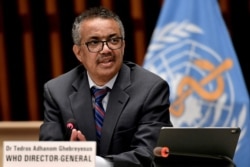The World Health Organization is issuing new guidelines on improving global air quality, which it says could save many of the seven million lives that are lost each year to pollution.
WHO Director-General Tedros Adhanom Ghebreyesus says inhaling dirty air increases the risk of pneumonia, asthma, and chronic obstructive pulmonary diseases, as well as noncommunicable ailments including heart disease, stroke and cancers.
"Air pollution is a health threat in all countries but especially for vulnerable groups in low- and middle-income countries with poor air quality due to urbanization and rapid economic development and air pollution in the home caused by cooking, heating and lighting," he said.
Since the WHO's last global update in 2005, a new body of evidence has emerged showing that humans suffer damage to their health at lower concentrations of air pollution than previously believed.
Consequently, the WHO recommends lower air quality levels for five key pollutants, including nitrogen dioxide, sulfur dioxide, and carbon monoxide.
Maria Neira, director of the WHO's department of environment, climate change and health, says a changeover to cleaner energy will improve people's health and mitigate global warming.
"Moving to renewable and clean sources of energy because [of] this will have a very positive impact on reducing the greenhouse gases emission and tackling the causes of climate change and reducing air pollution," she said. "Both are critical pillars of our health."
Besides improving health and saving lives, reducing air pollution could also have enormous economic benefits.
The World Bank estimates the global cost associated with health damage from ambient air pollution stands at $5.7 trillion a year.





